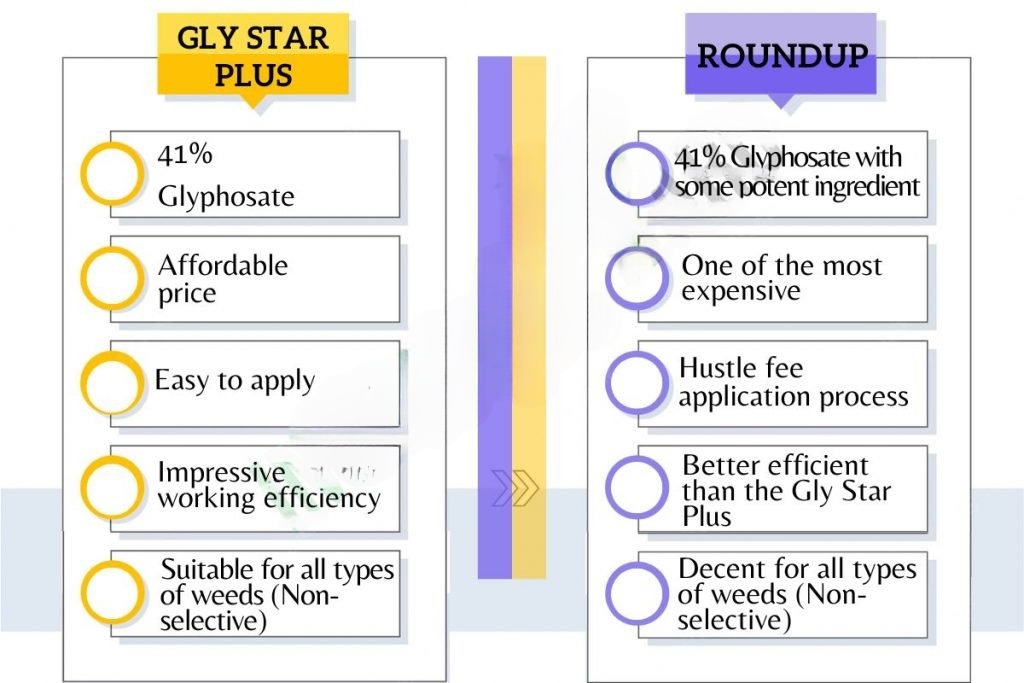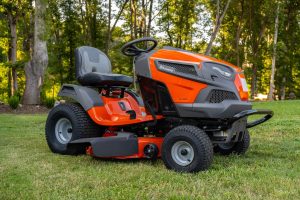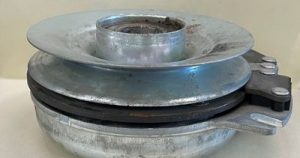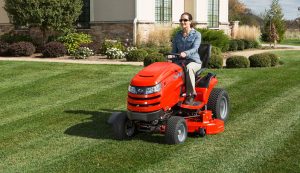Gly Star Plus And Roundup: We’ve Covered Every Question!

Where do Gly Star Plus and Roundup diverge? When comparing these two weed killers, one of the most noticeable differences is the price. Gly Star Plus weed killer is far less expensive than Roundup. However, you should exercise caution and not base your selection solely on price when selecting the weed killer.
When deciding between Gly Star Plus and Roundup, there are still a lot of details to take into account. Price, ingredients, application ratio, usability, and efficacy are just few of the areas where products might vary widely.
In this (hopefully) helpful tutorial, we’ll compare and contrast two widely used systematic herbicides and highlight the key differences between them.
Table of Contents
Roundup Vs Gly Star Plus
| Verifiable Contrasts | Gly Star Plus | Roundup |
| Ingredient | 41% Glyphosate | Contains 41% Glyphosate and other strong chemicals. |
| Price | Reasonable Cost | As one of the costliest |
| Application Process | Simple to use | Application for a Hustle Charge |
| Efficiency | Highly productive efforts | It’s more effective than the Gly Star Plus. |
| Best Use | Useful for any kind of unwanted vegetation (Non-selective) | Appropriate for most weeds (Non-selective) |
Does the above table making sense when comparing the two post-emergence herbicides? That’s what we’re hoping for, anyway.
Nonetheless, in the following section of this essay, we will examine the differences and similarities between Gly Star Plus and Roundup.
Analyzing Gly Star Plus and Roundup’s Active Ingredients
When considering the efficacy of a weed killer, the ingredients always play a pivotal part. The active element in both Gly Star Plus and Roundup is glyphosate, but the percentages are the same (51%).
However, the main distinction is that Roundup contains more advanced components. It’s an amine surfactant made from ethoxylated tallow. More than that, the component is what speeds up Roundup’s effectiveness.
To add to that, isopropylamine is a vital part of Roundup weed killer.
Comparison of Gly Star Plus vs Roundup’s Efficacy
As a more potent and swiftly acting weed killer, Roundup is preferable to Gly Star Plus. The upside is that it demonstrates how much sooner Roundup begins its beneficial effects than Gly Star Plus.
But why is this the case?
The primary explanation is that Gly Star Plus takes longer to reach the base of the problem than does Roundup. As a result, if you use Roundup, you’ll see that the weeds are dying the very next day.
When compared to that, the Gly Star Plus time frame is around two to four days.
Still, if forced to decide between Pgf complete and Milorganite, which would you pick?
The Distinctive Methods of Use for Gly Star Plus and Roundup
Let us start by pointing out something crucial. Both Gly Star Plus and Roundup are effective herbicides, so feel free to use whichever one you like on the weeds. Not in a way that would go straight into the ground. Glyphosate may harm soil in some cases.
The American public, however, is very familiar with both of these weedkillers. Both herbicides are effective against numerous types of vegetation. Both weed pesticides require the same general application procedure.
Roundup weed killer is applied at a rate of 3-6 fluid ounces (89-177 mL) per 1 gal of water. However, if you use 2-3 fluid ounces of Gly Star Plus per gallon of water, that should be fine.
Gly Star Plus vs. Roundup: Which Is Cheaper?
When deciding on a weed killer, cost can be an important factor. Gly Star Plus is less expensive than Roundup because it is a generic version of the brand-name product.
It’s possible, though, that the price range for these two weed killers will shift based on gallon size and/or sellers. You can save anywhere from $20 to $40 if you purchase Gly Star Plus instead of Roundup.
Which One Is More Efective, Roundup or Glyphosate?
In fact, both Glyphosate Plus and Roundup are effective and outstanding weed killers. Plus, neither pesticide is selective in its killing of plants. However, Roundup, as we explained, is more effective than just Glyphosate alone.
Roundup is an effective weed killer since it contains Glyphosate and other active chemicals including polyoxymethylene alkylamine. Consequently, in our opinion, it is best that you choose the Roundup, even though it will cost you more money.
FAQs
Can Grass be Killed with Gly Star Plus?
One of the most well-known weedkillers is Gly Star Plus. It has a high concentration of glyphosate, which can be used to eradicate numerous varieties of grass from their foundations. It’s fascinating to see the Gly Star Plus put to use so quickly. A few days from now, you’ll be able to see the outcome for yourself. This non-selective herbicide also provides extensive coverage. However, Gly Star Plus shouldn’t be relied on for long-term weed management.
After Taking Gly Star Plus, How Long Before You See Results?
The Gly Star Plus stars, fortunately, will be operational in about two to four days. This indicates that the herbicide or weed killer is effective quickly. However, it may take up to twenty to thirty days after applying Gly Star Plus on your grass before you notice the entire effect. However, the speed of action will vary based on the weeds present and the weather conditions in your location. Weed killer effectiveness can be slowed by extremely cold and gloomy conditions.
Is Roundup the Best Product Available?
Without a doubt, Roundup is one of the most effective weed killers on the market today. However, white vinegar or herbicidal soap are two options worth considering if you’re looking for an alternative to Roundup and organic options. Plus, let’s say you’re looking for an alternative to Roundup because you’re concerned about safety. Because it combines two powerful herbicides, Eraser Max is a superior option in that circumstances.
Where Does Gly Star Plus Fit In?
For a beautiful lawn or garden free of weeds and undesired grass, use Gly Star Plus. Gly Star Plus is formulated with 51% glyphosate and additional powerful chemicals. This non-selective systemic herbicide may quickly and effectively eliminate weeds from their roots all the way up to their leaves. The weed killer can be used on a wide variety of weeds, including annuals, perennials, woody brush, and so on. In addition, the weed killer is already a surfactant, so there’s no need to use any extra.
Do I Need Both Roundup And Gly Star?
The Gly Star is not the same thing as the Roundup. One of the most widely used weed killer brands is Roundup, and the Gly Star Plus is the generic equivalent. However, there are also distinctions when it comes to functionality. Roundup, for instance, is more efficient than Gly Star Plus.
What Should You Choose?
It’s time to make a choice between Gly Star Plus and Roundup after much deliberation. We gather that you are currently debating between two excellent weed killers. But before you go ahead and make a choice, we want to say a few things.
If you need your weed killer to be effective quickly, Roundup is your best bet. However, if cost is a concern, the Gly Star Plus is worth looking at. Gly Star Plus also requires less product per square foot when applied. In the end, that is all there is.







